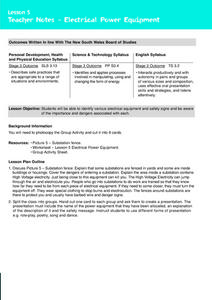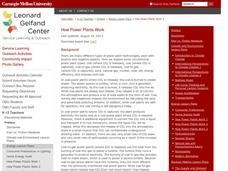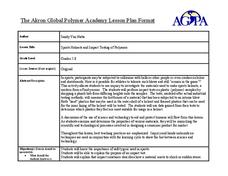Curated OER
Striking it Rich with Chemistry
Students identify the composition of different pennies. In this chemistry lesson, students use a post 1982 penny to observe chemical change. They explain how to turn a penny from copper to gold.
Curated OER
Introduction to Junkanoo! A Bahamian Festival
Learners examine a Bahamian festival called Junkanoo. They analyze how group cooperation is related to the festival. They finally identify how factions form and how they can help or hurt a community.
Curated OER
Science: Trouble in the Troposphere
Learners research a NASA Website and record information about an assigned city's tropospheric ozone residual monthly climate. In groups, they graph the information for the past year. They form new groups and compare their city's...
Curated OER
Introduction to Biomes
Eighth graders identify the different kinds of biomes. In this life science lesson, 8th graders explain their importance in an ecosystem. They take a BrainPop quiz at the end of the lesson..
Curated OER
Electrical Power Equipment
Students identify various electrical equipment and safety signs and the importance and dangers associated with each. They use cards of power equipment and create a presentation that includes the name of the power equipment that they...
Curated OER
A Simple Motor
Instructions for building a simple electromagnetic motor are provided for the teacher. Aside from some sketchy background information and a list of content standards to be met, that is about all you will find in this resource. The motor...
Carnegie Mellon University
How Power Plants Work 2
In this second of three lessons on power plants, future engineers find out how we generate electricity and how coal-powered plants operate. They work in small groups to make electromagnet generators to light LED bulbs. A set of...
Carnegie Mellon University
How Power Plants Work 3
Double, double toil and trouble, fire burn and cauldron bubble! Find out what drives a turbine to generate electricity and whether or not it has an impact on the environment. A discussion and lecture is divided by a hands-on activity in...
Curated OER
Sounds Like Great Science!
A phenomenal lesson on sound is here for your third graders! In it, learners engage in hands-on activities, watch video, take part in Internet activities, and complete tasks in cooperative groups in order to explore the world of sound...
Brooklyn Children’s Museum
Inside India
What can a Ganesh statue, hand ornament, and print block tell you about India? Introduce your learners to the geography, history, and culture of India by analyzing primary sources and using the well-designed worksheets provided in this...
Purdue University
Design of a Door Alarm
How does electricity work? Budding scientists explore the concepts of electrical currents and open and closed circuits with class discussion and a hands-on activity using a battery to turn on a light bulb. Learners also make predictions...
Curated OER
Uses of Coal
An interesting series of puzzles and word games are available in this multi-page collection, which focuses on coal. Learners practice math and language arts skills as they solve the puzzles, and learn many facts about coal at the same time.
Kenan Fellows
What Is Heat?
If objects have no heat, how do they can gain and lose it? Scholars experiment with heat, temperature, and specific heat of various substances. They create definitions for these terms based on their own conclusions to complete the fourth...
Cornell University
Glued into Science—Classifying Polymers
Explore the unique characteristics of polymers. A complete instructional activity begins with a presentation introducing polymers. Following the presentation, young scientists develop a laboratory plan for creating substances using...
Curated OER
Sometimes, solid + liquid = gas
Third graders experiment with common household liquids and solids. In this chemical reaction lesson, 3rd graders discuss phase changes and experiment to find other ways to create gases. They use water, vinegar, lemon juice, flour, baking...
Curated OER
Speakers in Action
Tune into C-Span and tape politicians delivering testimony before congress. Class members view these tapes, formulate a rubric for rating the effectiveness of such a speech, and then emulate best practices and include them in their own...
Curated OER
The Nutrients Public Transportation System
Students investigate the human circulatory system by experimenting with hoses. In this human body instructional activity, students create a system of hoses simulating the circulatory system which they utilize to pass objects...
Curated OER
Sports Helmets and Impact Testing of Polymers
Learners examine the importance of good quality safety gear. In this investigative lesson, students will tests various polymers, collect data, and analyze the data to determine which polymer is best for safety helmets. They will design a...
Curated OER
Discovering How a Car Works
Learners explain the four stroke process in internal combustion engines. In this physics lesson plan, students role play this process and present their reenactment in class. They draw and label the diagram of an internal combustion engine.
Curated OER
Water Cycle
Third graders define and discuss evaporation, precipitation, condensation, and collection, color web pages to illustrate Water Cycle book, listen to stories about Water Cycle, play trivia game to demonstrate knowledge of what they...
Curated OER
Integrating Biology: The Elements in Your Body
In this body elements instructional activity, students read about the chemical make-up of the human body and answer questions about the elements.
Curated OER
Light and Optics
Third graders utilize the scientific method to explain light and optics in this five lessons unit. Through experimentation and discussion, 3rd graders canvass the concepts of light traveling, reflection and refraction.
Curated OER
Create a New Animal
Students understand what physical adaptations are and how they help an animal to survive. In this adaptations lesson, students research four animals and then make an original animal that has adaptations to make them survive.

























